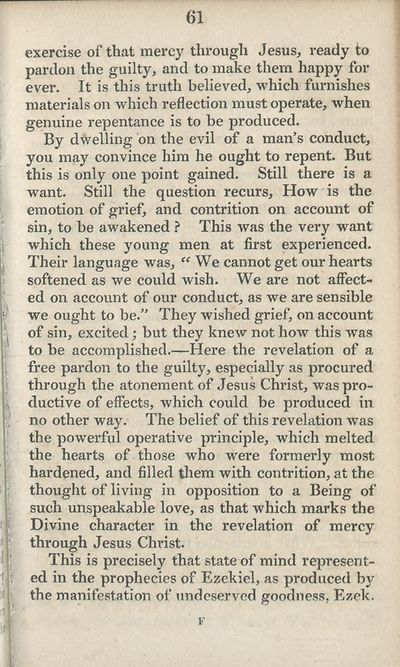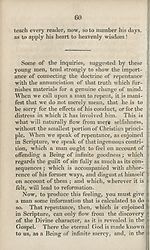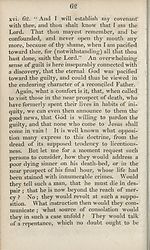Crime & punishment > Notes of conversations with H. M'Donald, N. Sutherland, and H. M'Intosh, (who were executed at Edinburgh, April 22, 1812,) during the time they were under sentence of death
(69)
Download files
Complete book:
Individual page:
Thumbnail gallery: Grid view | List view

61
exercise of that mercy through Jesus, ready to
pardon the guilty, and to make them happy for
ever. It is this truth believed, which furnishes
materials on which reflection must operate, when
genuine repentance is to be produced.
By duelling on the evil of a man’s conduct,
you may convince him he ought to repent. But
this is only one point gained. Still there is a
want. Still the question recurs. How is the
emotion of grief, and contrition on account of
sin, to be awakened ? This was the very want
which these young men at first experienced.
Their language was, “We cannot get our hearts
softened as we could wish. We are not affect¬
ed on account of our conduct, as we are sensible
we ought to be.” They wished grief, on account
of sin, excited; but they knew not how this was
to be accomplished.—Here the revelation of a
free pardon to the guilty, especially as procured
through the atonement of Jesus Christ, was pro¬
ductive of effects, which could be produced in
no other way. The belief of this revelation was
the powerful operative principle, which melted
the hearts of those who were formerly most
hardened, and filled them with contrition, at the
thought of living in opposition to a Being of
such unspeakable love, as that which marks the
Divine character in the revelation of mercy
through Jesus Christ.
This is precisely that state of mind represent¬
ed in the prophecies of Ezekiel, as produced by
the manifestation of undeserved goodness, Ezek.
exercise of that mercy through Jesus, ready to
pardon the guilty, and to make them happy for
ever. It is this truth believed, which furnishes
materials on which reflection must operate, when
genuine repentance is to be produced.
By duelling on the evil of a man’s conduct,
you may convince him he ought to repent. But
this is only one point gained. Still there is a
want. Still the question recurs. How is the
emotion of grief, and contrition on account of
sin, to be awakened ? This was the very want
which these young men at first experienced.
Their language was, “We cannot get our hearts
softened as we could wish. We are not affect¬
ed on account of our conduct, as we are sensible
we ought to be.” They wished grief, on account
of sin, excited; but they knew not how this was
to be accomplished.—Here the revelation of a
free pardon to the guilty, especially as procured
through the atonement of Jesus Christ, was pro¬
ductive of effects, which could be produced in
no other way. The belief of this revelation was
the powerful operative principle, which melted
the hearts of those who were formerly most
hardened, and filled them with contrition, at the
thought of living in opposition to a Being of
such unspeakable love, as that which marks the
Divine character in the revelation of mercy
through Jesus Christ.
This is precisely that state of mind represent¬
ed in the prophecies of Ezekiel, as produced by
the manifestation of undeserved goodness, Ezek.
Set display mode to:
![]() Universal Viewer |
Universal Viewer | ![]() Mirador |
Large image | Transcription
Mirador |
Large image | Transcription
| Permanent URL | https://digital.nls.uk/125759683 |
|---|
| Description | Thousands of printed books from the Antiquarian Books of Scotland collection which dates from 1641 to the 1980s. The collection consists of 14,800 books which were published in Scotland or have a Scottish connection, e.g. through the author, printer or owner. Subjects covered include sport, education, diseases, adventure, occupations, Jacobites, politics and religion. Among the 29 languages represented are English, Gaelic, Italian, French, Russian and Swedish. |
|---|

